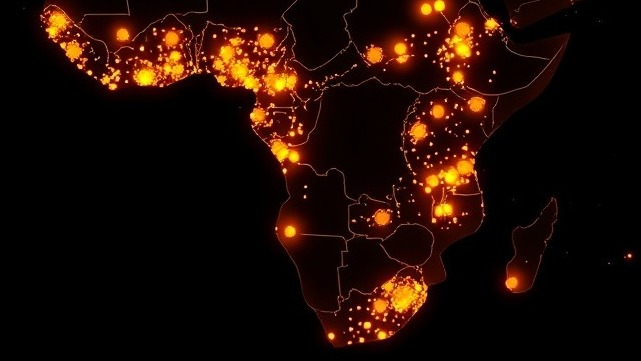Did you know that over 40% of small businesses across Africa lose customers each year simply because calls go unanswered? Now, imagine if missing a call never meant missing an opportunity. Across Lagos, Nairobi, Accra, and even London, voice AI automation for small business customer service, lead qualification, and appointment scheduling is not just a buzzword, it's the unseen force that's closing the gap between local ambition and global standards.“African entrepreneurs aren’t just catching up, they’re leapfrogging with technology like voice AI automation to create world-class customer experiences, right from Lagos, Nairobi, Accra, or London.”A New Era: Why Voice AI Automation Is Transforming Small Business Customer Service, Lead Generation, and SchedulingVoice AI automation for small business customer service, lead qualification, and appointment scheduling across Africa and global markets is changing the enterprise landscape for African entrepreneurs. In a continent where business happens on the move, on mobile, in local dialects, often without guaranteed data or electricity, technology has become an equalizer, not a barrier. Gone are the days when only multinational companies could afford 24/7 phone lines and seamless customer engagement. Thanks to AI voice agents, even a single-person retail shop or a budding medical clinic can deliver responsive, round-the-clock service, qualify leads, and schedule appointments with clients both in their neighbourhood and a continent away.Imagine a business owner in Lagos never losing a customer to a missed call, an e-commerce entrepreneur in Nairobi qualifying leads while packing shipments, or a real estate advisor in London confirming property viewings from clients in both Accra and Manchester, all without hiring extra staff. That’s the present reality with the adoption of voice agents powered by cutting-edge AI, designed specifically to handle multilingual, mobile-first African markets. The return? Fewer wasted opportunities, boosted loyalty, and operational costs that make sense, even for the most budget-conscious SME.Unveiling the Statistic: Over 40% of African Small Businesses Lose Customers Due to Missed CallsAcross Africa’s dynamic markets, calls are often the first point of customer contact. Yet, research consistently shows that up to 40% of small businesses report losing clients because incoming calls go unanswered. In a landscape where every customer interaction counts, missing these opportunities can be the difference between growth and stagnation. Voice AI automation changes this script by eliminating the human limitations of multitasking, unpredictable hours, or even electricity outages.By implementing AI voice agents, businesses ensure every call is engaged, queries are answered in real-time, using natural language that matches local context, and no potential customer slips through the cracks. It’s more than just automating lead response; it’s about protecting the business’s reputation and future revenue streams. For African entrepreneurs, this is not just a solution, it’s a competitive edge in an increasingly digital, customer-centric world.Voice AI: The Great Equalizer for African Business OwnersFor too long, access to world-class customer service tools has been reserved for larger businesses with deep pockets. Voice AI automation flips the script entirely. With the right solution, African business owners can deploy AI-powered voice agents capable of handling customer inquiries simultaneously, qualifying leads instantly, and managing appointments without the need for costly call centre infrastructure.What sets voice AI apart is its adaptability. It works via mobile phones (not just expensive smartphones), understands a range of languages and dialects, and can deliver service excellence even with unpredictable connectivity. Rather than relying on traditional infrastructures, African businesses are leapfrogging to the front, with AI agents shaping a level playing field where innovation and customer experience, not legacy systems, dictate success.From Mobile Microbusiness to Global Player: How Voice AI Automation Levels the Playing FieldVoice AI automation for small business customer service, lead qualification, and appointment scheduling is redefining what it means to start small in Africa. The e-commerce seller working from a spare bedroom in Nairobi can now offer 24/7 multilingual support rivaling global competitors. A diaspora business owner in London can book appointments for clients across time zones, effortlessly and reliably.With scalable subscription models and easy setup, AI voice agents are making advanced customer service tools accessible to SMEs, clinics, salons, and agencies. No matter your business size or sector, this wave of innovation allows you to grow beyond borders, serve diaspora clients, and connect with customers the moment opportunity calls, literally and figuratively.What You’ll Learn About Voice AI Automation for Small Business Customer Service, Lead Qualification, and Appointment SchedulingHow voice AI automation works in multilingual, mobile-first marketsPractical use cases tailored for African SMEs, startups, and entrepreneursStep-by-step voice agent implementation and expected ROICommon pain points, and how African business owners are overcoming themSolutions for intermittent connectivity, varying device types, and budget constraintsUnderstanding Voice AI Automation for Small Business Customer Service, Lead Qualification, and Appointment SchedulingDefining Voice AI, AI Voice Agent, and AI Agent in the Context of African BusinessSo, what exactly is voice AI automation for small business customer service, lead qualification, and appointment scheduling? In simple terms, a voice AI agent uses artificial intelligence to understand spoken queries (in your customer’s language), respond instantly, qualify leads through two-way conversation, and set or confirm appointments—often faster than any human assistant. Unlike chatbots tied to a website, AI voice agents work over calls, WhatsApp, and SMS, wherever your customers are.For African businesses, deploying an ai agent means bridging the gap between manual communication and automated customer support. These agents are trained using your business’s own knowledge base, so they “speak” with local expertise: recommending a hair treatment, answering medical FAQs, or updating appointment times, all with the cultural context and multitasking ability that makes service feel personal, not robotic.AI Capabilities: What Makes Voice AI Agents Adaptable for Small Business?The game-changer for African entrepreneurs lies in the AI capabilities baked into modern voice agents. Whether you’re a small clinic or a busy market stall, today’s AI voice agent solutions offer adaptive automation, meaning they learn from your business data, tailor conversations, and handle repetitive tasks that would otherwise drain your time and resources.Flexibility matters. These agents can process speech recognition with local accents, provide customer support in multiple languages, and follow up via WhatsApp or SMS when calls drop due to connectivity issues. Perhaps most importantly, they’re accessible, requiring no advanced tech skills and working across a range of devices from simple mobiles to sophisticated POS systems. In other words, AI agents empower you to create custom customer experiences at scale, keeping service levels high while reducing overall operational costs.Natural Language, Multilingual Support, and the Reality of the African Customer BaseIf you serve customers across Africa, you know that language isn’t one-size-fits-all. Today’s voice AI systems are built with advanced natural language processing, the ability to understand and converse in dozens of languages and dialects. This goes far beyond basic “press 1 for English” menus. These AI voice agents can greet a customer in Igbo, clarify details in Swahili, and respond in crisp English for diaspora or international clients, all within the same customer journey.This multilingual fluency builds rapport and trust, qualifying leads more effectively and ensuring customers feel understood, literally. With natural language at the heart of AI automation, businesses eliminate the risk of miscommunication and serve diverse markets efficiently, without hiring a multilingual team. The result: broader reach, more loyalty, and higher conversion rates.How Voice AI Integrates with Knowledge Base and Existing ToolsIntegration is critical for SMEs looking to avoid technical headaches. Voice AI solutions today are designed to plug directly into your everyday tools, be it CRM, WhatsApp, POS, or online appointment calendars. By tapping into your knowledge base, your AI agent delivers up-to-date answers, automates lead qualification, and manages tasks like appointment reminders, order confirmations, and more.This seamless integration ensures your workflows remain uninterrupted while your service levels increase dramatically. Best of all, you keep full control over customer data, allowing for a consistent brand experience across every touchpoint, mobile, web, or in person.Real-World Examples: Voice AI Automation Success Stories from Africa and The Diaspora“We started with just a WhatsApp line, now with an AI voice agent, clients book appointments with us 24/7, even during power outages.” - Medical Clinic Owner, AccraLead Generation Transformed: An E-commerce Entrepreneur in Nairobi’s ExperienceMeet Linda, an e-commerce business owner based in Nairobi. Juggling order fulfillment and marketing, she struggled with missed calls and stale leads, until she deployed a voice AI agent. Lead generation skyrocketed as the AI handled routine inquiries, qualified potential customers, and even recommended products in English, Kiswahili, and Sheng. Linda could focus on scaling her shop, trusting that her AI was active 24/7, never missing a sales opportunity, even during peak hours or connectivity hiccups.Her journey demonstrates a powerful principle: AI voice automation for customer service and sales isn’t about replacing people, it’s about keeping every customer engaged, answering queries instantly, and freeing up business owners for the big-picture work. With AI handling the repetitive tasks, growth becomes a function of vision, not bandwidth.Voice Agents for Customer Service: The Lagos Salon Owner’s LeapChinedu runs a bustling salon in Lagos, serving clients who prefer to call for bookings, service information, or last-minute rescheduling. With an AI agent answering calls, managing FAQs, and handling WhatsApp messages, Chinedu’s customer satisfaction soared—even on holidays or during citywide outages. His clients now enjoy real-time responses in both Yoruba and English, and the salon never loses business to a missed call.This level of customer engagement and operational resilience, once only possible for large chains, is now within reach for every committed entrepreneur willing to invest in AI innovation.Appointment Scheduling Milestones: How a Diaspora Real Estate Agency Drives Global BookingsFor a real estate agency based in London but serving investors across Accra and Lagos, global appointment booking used to be a logistical headache. By adopting voice AI automation, bookings are handled round-the-clock (adjusting automatically for time zones), with natural language support for both local African clients and overseas investors.Real estate team members save hours daily, clients always reach a helpful voice (never voicemail), and the business owner enjoys higher conversion rates, all without increasing the payroll or needing a team on call 24/7.The Tangible Benefits: Why Small Business Owners Are Investing in Voice AI Automation for Customer Service, Lead Generation, and Scheduling24/7 customer engagement, even without a data-heavy smartphoneSeamless omnichannel support (voice calls, WhatsApp, SMS, and more)Consistent lead qualification across languages and regionsCost reduction compared to manual agentsHigher conversion and client satisfaction ratesTables: Comparing Manual vs. AI Voice Agent Performance in African Small BusinessesMetricManual AgentAI Voice AgentMissed Calls60%<10%Lead Qualification Speed3-6 min<30 secAppointment Bookings per Day840+Language Coverage1-2 languages10+ languagesMonthly CostHighModerateBreaking Down Voice AI Automation: Lead Generation, Customer Service, and Appointment SchedulingHow Voice AI Drives High-Quality Lead Generation in African MarketsVoice AI automation gives African SMEs a potent toolkit to automate lead capture and qualification without sacrificing the “human” touch. Whether via phone, WhatsApp, or SMS, modern voice AI agents initiate conversations, gather relevant qualifiying details, and assess intent or urgency, ensuring only high-value leads reach the business owner. This not only accelerates the sales process but improves overall lead quality, as every inquiry gets a response, even in local languages, and at any hour of day or night.Moreover, these agents provide consistent, culturally attuned communication, so leads don’t just feel like another number in the pipeline. Instead, potential clients experience immediate engagement—making them more likely to book, buy, and refer others. With reduced manual workflows, entrepreneurs can focus on what matters most: building lasting relationships and scaling with confidence.Supercharging Small Business Customer Service With AI Voice AgentsThe biggest pain point for many African business owners? Scaling customer service while staying affordable. AI voice agents are built to address this challenge directly by handling thousands of customer interactions across voice, text, and online channels, all in real time. Whether you run a small and medium-sized shop, a local salon, or a healthcare practice, AI voice agents never take breaks, never get overwhelmed, and always offer consistent, branded responses based on your business’s knowledge base.This supercharged customer service reduces customer wait times, resolves inquiries effectively, and minimizes operational costs. The net effect? Higher customer loyalty and dramatic improvements in the overall customer experience.AI for Appointment Scheduling: Handling Time Zones, Languages, and Device DiversityNo more missed or double-booked appointments—AI-powered scheduling tools manage time zones, send reminders, and reschedule even during staff absences or data blackouts. For multi-city businesses or diaspora agencies, these tools allow simultaneous booking across borders, with automatic calendar updates and multilingual communication.Even better, customers can schedule or confirm appointments from a simple phone call, a WhatsApp message, or an SMS, whatever is most convenient, while the AI handles all the backend complexities seamlessly.Voice Agents in Practice: Salon, E-commerce, Real Estate, Healthcare & MoreLet’s recap a few ways voice AI agents are making a difference:Salons: No more missed appointment calls, even on busy days.E-commerce: Automated order confirmations, product recommendations, and support in multiple languages.Real Estate: 24/7 property viewing bookings, client follow-up, and cross-border scheduling support.Healthcare: Real-time appointment setting, answering FAQs, and triaging patient messages.How To Implement Voice AI Automation for Small Business Customer Service, Lead Qualification, and Appointment SchedulingStep 1: Assessing Your Needs—What Gaps Can Voice AI Fill?Start by mapping your current customer interaction points: where do you lose customers, missed calls, lost leads, manual appointment booking, language miscommunication? Identify the critical gaps in your customer journey; this will help you choose a voice AI agent tailored to your priorities, whether it’s omnichannel engagement, lead generation, or appointment automation.Consider surveying your team and top clients for feedback: What are their frustrations? Which languages do your customers use most? What’s your peak call or inquiry time? A clear needs assessment ensures the solution fits your context, and not the other way around.Step 2: Choosing a Voice Agent, Priorities for African Markets (Mobile, Multilingual, Low Bandwidth)When selecting a voice AI agent, prioritise platforms that support multiple local languages, offer WhatsApp and SMS integration, and work reliably in low-bandwidth scenarios. Consider whether the solution offers a pay-as-you-grow model and local African language support. For most SMEs, an agent that can be deployed on both basic mobile phones and smartphones ensures widest reach.Test the AI’s natural language processing skills using common local phrases or product names. Accessibility, adaptability, and local focus are your must-have checkboxes.Step 3: Integrating AI Voice With Your Knowledge Base and Tools (POS, WhatsApp, CRM)Effective deployment means your AI agent should integrate seamlessly with your existing tools. Sync it with your knowledge base (FAQs, product details, appointment availability), point-of-sale systems, CRMs, and communication channels like WhatsApp. This ensures consistency in customer service and frees your staff to focus on core tasks, unhindered by repetitive support questions or manual scheduling duties.A strong integration plan means customers always get up-to-date info, and every touchpoint (voice, text, social) feels informed and responsive.Step 4: Training Your AI Agents for Real Business ScenariosSpend time teaching your voice AI agent about your unique business situations: product ranges, regular customer requests, seasonal changes, or common pain points. Most platforms offer simple interfaces for business owners and staff to “train” the agent, often without a single line of code. Use real call scripts and FAQs, refine over time, and get feedback from your frontline staff to fine-tune the responses.Remember, the more you personalize the experience, the more your AI becomes an extension of your brand, not just a tool.Step 5: Measuring and Scaling Results, What Success Looks LikeSuccess is measured by reduced missed calls, faster lead qualification, higher appointment bookings, and increased customer satisfaction scores. Use built-in dashboards or reports to track performance in real time. Gather testimonials and feedback from your customers, ask if they’ve noticed better response times and improved engagement.As you see ROI grow, expand the AI’s responsibilities or scale to new business units, cities, or regions.Lists: What Makes an AI Voice Solution African-SME-Friendly?Works on basic mobile and smartphone devicesHandles multiple local languages and dialectsLow-data, offline-capable fallback modesSimple integration with WhatsApp, SMS, POS, and CRMAffordable, pay-as-you-grow pricing modelsEasy setup—no coding or technical background requiredResilient to power outages and intermittent connectivityComplies with local data security standardsOn-demand reporting and analyticsSupports customer experience customisationHow Voice AI Automation Overcomes African Small Business ChallengesMobile-First and Intermittent Connectivity: Voice AI Tactics for ResilienceAfrican entrepreneurs excel at doing business “on the go.” Yet mobile-first operations and unpredictable internet present unique obstacles. Modern voice AI solutions are built with these realities in mind. They deliver customer engagement over voice, SMS, or WhatsApp—and can automatically switch communication channels when data drops or calls cut off. Offline-capable fallback, data-light processes, and prompt recovery make AI tools ideal for bustling markets, remote shops, or service businesses navigating the day’s uncertainties.The result: customers receive uninterrupted service, and business owners never have to apologize for a missed opportunity due to infrastructure constraints. Instead, technology becomes a source of continuity and trust.Multilingual Customer Service: From Local Dialects to International ClientsWith over 2,000 languages spoken across the African continent, multilingual support isn’t a luxury, it’s a necessity. Voice AI agents leverage the best in AI language processing to deliver customer service in the preferred language of your audience, whether Swahili in Nairobi, Yoruba in Lagos, or French in Abidjan. This removes a key barrier to trust and effectively “localizes” global business standards for community-focused SMEs.For diaspora businesses, the ability to offer multilingual support also enables seamless engagement with clients around the world, strengthening both brand loyalty and market reach.Managing Budget Constraints: Low-Cost, High-Impact Voice AgentsCost is often the deciding factor for small businesses considering automation. The good news? Most voice AI solutions are built specifically for SMEs, offering monthly subscriptions or pay-per-use pricing models. With no need for large up-front investments, and utility on both entry-level and advanced devices, African entrepreneurs can see a direct return on investment from the first month, often saving up to 70% compared to hiring additional staff for customer calls.As your business grows, so can your AI’s capacity, providing an affordable, scalable way to keep customer experience high and operational costs in check.Ensuring Data Security and Customer Trust in Emerging MarketsData privacy and customer trust cannot be ignored, particularly in emerging markets. Look for voice AI providers who comply with local and international data protection standards, offer encrypted communications, and give business owners control over stored customer data. Transparent policies and clear opt-in messaging can further build confidence with your clients, ensuring your business remains compliant, credible, and ahead of potential regulatory shifts.FAQs on Voice AI Automation for Small Business Customer Service, Lead Qualification, and Appointment SchedulingWhat is the best AI for customer service?The best voice AI automation for small business customer service, lead qualification, and appointment scheduling across Africa and global markets is one that supports multilingual natural language, integrates with your current tools like WhatsApp and CRM, and delivers reliable results even under connectivity constraints. Popular solutions include options tailored for African SMEs and global offerings such as Google Dialogflow and Twilio Voice.How to implement AI customer service?Implementing an AI voice agent or AI voice automation for small business starts with defining your customer service goals, mapping your current customer journeys, and selecting a platform designed for flexible integration with your existing mobile tools and support for local languages. Then, test, train, monitor, and scale as your business grows and customer demands evolve.What skills are needed for AI customer service?Essential skills include understanding your business workflows, familiarity with digital communication tools, and basic data analysis. No coding is required for most platforms, but willingness to experiment, train your AI agent, and embrace new technology will set you up for long-term success.What is conversational AI for customer service?Conversational AI for customer service uses AI voice and natural language capabilities to communicate with customers, answer queries, qualify leads, and schedule appointments through voice, WhatsApp, or other channels, automatically, and at scale. It delivers a seamless, human-like experience for your clients, 24/7.Key Takeaways: Voice AI Automation for Small Business Customer Service, Lead Qualification, and Appointment SchedulingVoice AI automation is practical, affordable, and transformative for African SMEsMultilingual, omnichannel capability increases reach and conversionReal-world business owners across Africa are already seeing dramatic ROIImplementation is straightforward with the right strategyVoice AI agents make missed calls and manual lead loss a thing of the pastConclusion: The Future of African Business Is Automated, Accessible, and GlobalThe tools are here: with voice AI automation, African and diaspora entrepreneurs can deliver customer service worthy of any global competitor, all while honouring the unique realities of their market.“With voice AI agents, the smallest business can offer the kind of service that turns every call, not just into a conversation, but an opportunity.”Do not Let Another Customer Hang Up Because You Could not Answer their call. Explore Voice AI Solutions That Fit Your Budget.People Also Ask: Voice AI Automation for Small Business Customer Service, Lead Qualification, and Appointment SchedulingWhat is the best AI for customer service?Answer:The best voice ai automation for small business customer service, lead qualification, and appointment scheduling across Africa and global markets is one that supports multilingual natural language, integrates with your current tools like WhatsApp and CRM, and delivers reliable results even under connectivity constraints. Popular solutions include region-tailored platforms and leading global providers like Google Dialogflow and Twilio Voice.How to implement AI customer service?Answer:Implementing ai voice agent or ai voice automation for small business starts with defining your customer service goals, mapping your current customer journeys, and selecting a platform designed for flexible integration with your existing mobile tools and support for local languages. Test, train, monitor, and scale as needed.What skills are needed for AI customer service?Answer:Essential skills include understanding your business workflows, familiarity with digital communication tools, and basic data analysis. No coding is required for most platforms, but a willingness to experiment, train your AI agent, and engage with new technology is key.What is conversational AI for customer service?Answer:Conversational AI for customer service uses ai voice and natural language capabilities to communicate with customers, answer queries, qualify leads, and schedule appointments through voice, WhatsApp, or other channels, automatically, and at scale.Video: How Voice AI Agents Transform Customer Engagement in African Small BusinessAnimation video: Timeline showing small businesses across Africa transitioning from missed calls and manual scheduling to AI voice agents enabling 24/7 engagement, lead qualification, and seamless appointment booking. Features mobile-first customer scenarios, multilingual interactions, and split-screen views of business owners monitoring live AI reports. Style is colourful, modern, with animated icons and smooth transitions. Duration: 1–2 min.Video: Step-by-Step Demo, Implementing Voice AI Automation for Lead GenerationSee a walkthrough of deploying and customizing a voice AI agent tailored for an African small business, showcasing initial set-up, knowledge base integration, multilingual response testing, and real-time appointment booking with clients from different channels.Lists: 10 Ways Voice AI Automation Elevates Small Business Service in AfricaNo missed calls, ever againMultilingual customer support on autopilotReal-time lead qualificationSeamless appointment booking, even without human staffAutomated FAQs and knowledge base supportCRM/WhatsApp integrationQuick onboarding for non-technical staffOperates reliably in low-bandwidth environmentsDetailed performance reportingConsistent brand experience across every channelSourceshttps://www.mckinsey.com/industries/technology-media-and-telecommunications/our-insights/africas-digital-future – Example Sitehttps://techcrunch.com/africa/ – Example Sitehttps://www.gsma.com/mobileeconomy/sub-saharan-africa/ – Example Sitehttps://www.dialogflow.com/ – Example Sitehttps://www.twilio.com/ – Example SiteVoice AI automation is revolutionizing small business operations by enhancing customer service, lead qualification, and appointment scheduling. For instance, Uzoma AI offers a 24/7 intelligent voice receptionist that answers business calls, books appointments, and handles customer inquiries automatically, ensuring businesses never miss an opportunity. (uzoma.ai) Similarly, The Lead Pros provides AI-powered phone call systems that manage customer support, appointment bookings, and lead qualifications without the need for coding, allowing businesses to maximize lead conversions efficiently. (lead-pros.ai) By integrating such AI solutions, small businesses can deliver consistent, multilingual support and streamline operations, positioning themselves competitively in both African and global markets.







 Add Row
Add Row  Add
Add 




Write A Comment